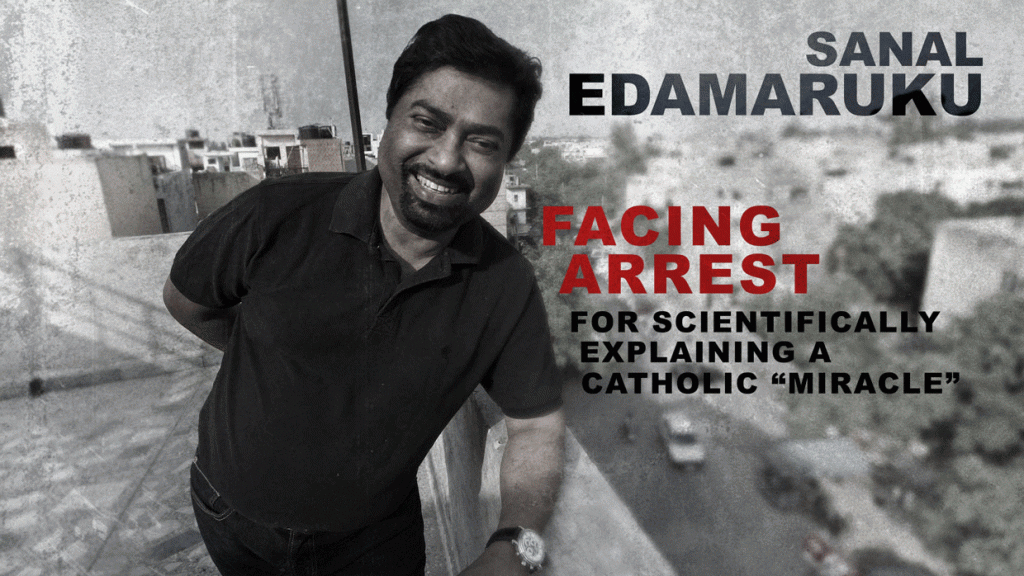Catholic groups in India have brought blasphemy charges against Sanal Edamarauku, the country’s most prominent rationalist. They may get more than they bargained for, says Caspar Melville

Sanal Edamaruku is facing up to three years in an Indian jail for telling the truth.
For the past two decades Edamaruku, president of the Indian Rationalist Association, has been spearheading a campaign of de-mystification and public education aimed at undermining the power of the fake gurus and God-men who still wield considerable power in India. In a never-ending series of rationalist roadshows Edamaruku and his merry band of debunkers have traversed India, setting up on street corners in big cities and small towns. On first glance they are no different from the travelling shows of the sadhus and gurus who criss-cross India performing miracles for cash. The rationalists perform a series of these same “miracles” — coconuts crack open and appear to bleed, beds of nails are reclined on, bodies levitated under sheets, flesh pierced without blood. Once the crowd is sufficiently enraptured, the curtain is dropped, and Edamaruku’s team explain that each miracle is a trick, and how that trick is performed. When they pack up, they leave ordinary Indians inoculated against the tan-tricks and supernatural claims of the fakirs, and better informed about basic scientific processes. “What may look like Sunday entertainment for children,” Edamaruku says, “is nothing less than breaking the little hook on which the god-men’s enormous power, and the fate of their victims, hangs.”
In recent years the roadshow has moved into the TV Studio. Edamaruku has become something of a star, the hardest working man in the debunking business – last year he estimates he did 200 appearances. He is usually called on to pour cold water on supernatural claims. In one famous instance, the “Great Tantra Challenge” of 2008, he challenged the self-styled guru Pandit Surinder Sharma to prove his claim that he was so powerful he could kill with the power of his mind. After several hours of trying to kill Edamaruku he was forced to withdraw, utterly deflated.
Alongside vanquishing charlatans Edamaruku delights in debunking miracles — revealing the mundane scientific processes that lie behind these supposed supernatural events. The statue of Ganesh that actually drinks milk? No, capillary action as the stone dries. The coconut that rolls by itself compelled by mystical force? Nope, there’s a mouse inside. A statue of Christ dripping holy water? Sorry, it’s just a leaky tap.
But this is where the trouble started. Following these last revelations in April this year concerning a “miraculous” weeping statue at the Catholic Church of Our Lady of Velan Kanni in Vile Parle, Mumbai, the debunkees went on the offensive. Various Catholic groups, including the seemingly unironically-named Catholic Secular Forum, acting, apparently, with the tacit support of the Archdiocise of Mumbai, brought a complaint against Edamaruku, under article 295(a) of the Indian Penal Code which functions as a de facto blasphemy law, making “deliberate and malicious acts, intended to outrage of insult religious feelings” an offence punishable by up to 3 years in jail. Letters started to arrive at Edamaruku’s Delhi offices from the Mumbai police demanding that he present himself to answer the allegations. His legal attempt to secure “anticipatory bail” — which would have meant he could be sure to be released after questioning — was turned down. He found himself facing the prospect of being picked up by the police and incarcerated for an indefinite period, pending whatever case was eventually brought. Edamaruku felt he had no option but to leave the country — he is currently staying in Europe and visiting Britain briefly next week (where he will speak at a free event to publicise his case).
However, he is not running from the case. Since the original allegations were made something of a public furore has been ignited in India. The Archbishop of Mumbai has claimed that he was not behind the allegations, and that all could be smoothed over if only Edamaruku issued an apology, something he refuses to do. After all, he says, why should he apologise for telling the truth? More than that he thinks it’s time that India’s blasphemy law — legacy of colonialism, put in place in 1860 to tamp inter-communal strife and ensure a smooth-running Raj – was challenged. He would like to take his case to the Indian Supreme Court and challenge section 295(a) on the basis that it conflicts with provisions in the Indian constitution which protect free speech and promote the scientific temper.
The case could have major consequences, and not just in India. Neighbouring Pakistan also inherited 295(a) from the British, which General Zia l-Huq went about strengthening in the 80s adding sections (b), (c) and (d) which explicitly outlaw blasphemy against the Qur’an and Muhammad, the latter offense carrying a mandatory death sentence. These laws have become a weapon for settling personal scores and furthering the agenda of religious extremism, according to the journalist Beena Sarwar, and there is growing clamour in Pakistan for reform. Edamaruku’s campaign could help bring the issue the public attention and support needed to push through legal reform in both countries.
There is a serious debate to had about whether countries with histories of inter-faith violence do need to protect religions from hate speech. Religious minorities continue to require legal protection from persecution. But can the law be used to protect feelings? Can you legislate against offence without compromising free speech? Hopefully participants in Wednesday’s debate, including the retired judge Stephen Sedley, can kickstart such a debate. What is clear is that in bringing such charges against Sanal Edamaruku, someone articulate, determined and armed with irrefutable scientific facts, these Catholic groups — no doubt cheered on by Sadhus and gurus with lucrative snake-oil careers to protect — have chosen the wrong issue, and the wrong target.
Caspar Melville is editor of New Humanist Magazine. For tickets and details of New Humanist and Index on Censorship’s free event with Sanal Edamaruku, Stephen Sedley and journalist and novelist Salil Tripathi, click here




